The Ballad of Martin Luther King

Come gather round me, people
(Continues)
(Continues)
Contributed by Donquijote82 2015/4/3 - 15:40
Song Itineraries:
Martin Luther King
Give Peace A Chance
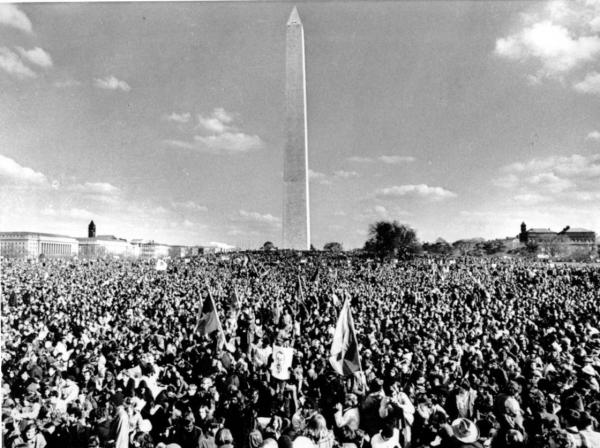
Intervista a Pete Seeger sull'uso di "Give Peace A Chance" durante la marcia contro la guerra nel Vietnam al Washington Monument, il 15 novembre 1969:
da Democracy Now
JON WIENER: Well, you know, Lennon wanted to — basically, Lennon is a musician, a songwriter, a performer. He wanted to write a song for the movement, and he did. It was "Give Peace a Chance." It did become the anthem of the anti-war movement. Half a million people sang "Give Peace a Chance" in a demonstration at the Washington Monument in the fall of 1969. Do we have time to listen to my interview with Pete Seeger, talking about what it was like that day?
PETE SEEGER: Well, in November 1969, I guess I faced the biggest audience I had ever faced in my entire life. Hundreds of thousands, how many, I don’t know, but it stretches as far as the eye can see, up the hillside and over the hill, past the Washington Monument.... (Continues)
2013/12/8 - 21:10
False From True
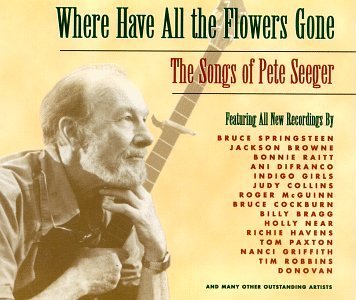
[1968]
Parole e musica di Pete Seeger
Nel disco “Pete Seeger Now”, con Bernice Reagon e Frederick Douglass Kirkpatrick.
Più recentemente nel disco tributo “Where Have All The Flowers Gone - The Songs Of Pete Seeger” interpretata da Guy Davis
Parole e musica di Pete Seeger
Nel disco “Pete Seeger Now”, con Bernice Reagon e Frederick Douglass Kirkpatrick.
Più recentemente nel disco tributo “Where Have All The Flowers Gone - The Songs Of Pete Seeger” interpretata da Guy Davis
When my songs turn to ashes on my tongue,
(Continues)
(Continues)
Contributed by Dead End 2013/3/7 - 15:59
Ballad of Paul Robeson
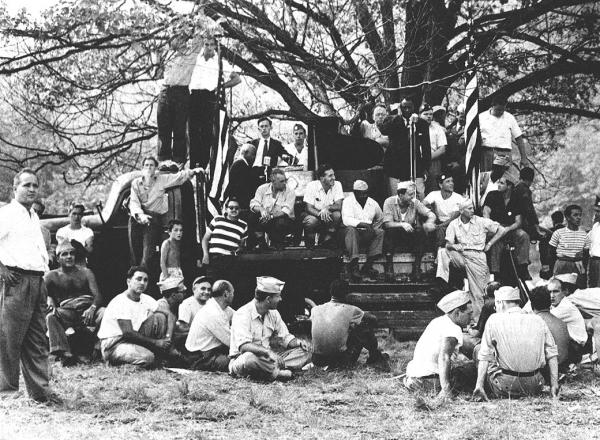
[1972]
Album "Ballads of Black America", Folkways Records.
With Pete Seeger, banjo, and Jeanne Humphries, bass.
"Paul Robeson. Born 1898 in Princeton, New Jersey. Won a scholarship to Rutgers University and was a Phi Beta Kappa honor student and All American football player. Received a law degree from Columbia University but because of his extraordinary musical talent became a leading star of opera, stage and films. Always active in civil rights, he was blacklisted from show business due to his Communist sympathies, His talents and leadership will never be forgotten." (dall'introduzione al brano contenuta nel libretto che accompagna l'album)
La canzone fa riferimento ai cosiddetti "Peekskill Riots" accaduti nell'agosto del 1949 nella contea di Westchester, New York, quando una torma di fascisti e razzisti – con l'appoggio della polizia locale - impedirono a Paul Robeson di esibirsi in... (Continues)
Album "Ballads of Black America", Folkways Records.
With Pete Seeger, banjo, and Jeanne Humphries, bass.
"Paul Robeson. Born 1898 in Princeton, New Jersey. Won a scholarship to Rutgers University and was a Phi Beta Kappa honor student and All American football player. Received a law degree from Columbia University but because of his extraordinary musical talent became a leading star of opera, stage and films. Always active in civil rights, he was blacklisted from show business due to his Communist sympathies, His talents and leadership will never be forgotten." (dall'introduzione al brano contenuta nel libretto che accompagna l'album)
La canzone fa riferimento ai cosiddetti "Peekskill Riots" accaduti nell'agosto del 1949 nella contea di Westchester, New York, quando una torma di fascisti e razzisti – con l'appoggio della polizia locale - impedirono a Paul Robeson di esibirsi in... (Continues)
Paul Robeson, dear Robeson
(Continues)
(Continues)
Contributed by Alessandro 2010/3/24 - 12:42
Song Itineraries:
Racism and Slavery in the USA
Ballad of Sojourner Truth
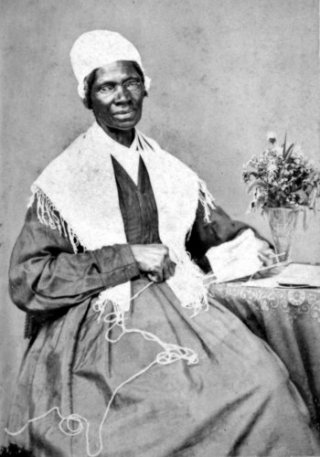
[1972]
Album "Ballads of Black America", Folkways Records.
With Pete Seeger, banjo, and Jeanne Humphries, bass.
"Born Isabella Baumfree, a slave in Ulster County, New York 1797. Inspired by God in 1843, she changed her name to Sojourner Truth and became a champion of women's rights as well as a fervent abolitionist. Known throughout the land, she helped desegregate the streetcars. Died in Battle Creek, Michigan, 1883." (dall'introduzione al brano contenuta nel libretto che accompagna l'album)
Sojourner Truth è stata un'abolizionista e proto-femminista afro-americana divenuta celebre per il discorso "Ain't I a Woman?" che ella fece durante nel 1851 durante la Women's Rights Convention ad Akron in Ohio. La canzone di Douglass Kirkpatrick riprende in gran parte i contenuti di quel discorso...
Album "Ballads of Black America", Folkways Records.
With Pete Seeger, banjo, and Jeanne Humphries, bass.
"Born Isabella Baumfree, a slave in Ulster County, New York 1797. Inspired by God in 1843, she changed her name to Sojourner Truth and became a champion of women's rights as well as a fervent abolitionist. Known throughout the land, she helped desegregate the streetcars. Died in Battle Creek, Michigan, 1883." (dall'introduzione al brano contenuta nel libretto che accompagna l'album)
Sojourner Truth è stata un'abolizionista e proto-femminista afro-americana divenuta celebre per il discorso "Ain't I a Woman?" che ella fece durante nel 1851 durante la Women's Rights Convention ad Akron in Ohio. La canzone di Douglass Kirkpatrick riprende in gran parte i contenuti di quel discorso...
I am a woman too
(Continues)
(Continues)
Contributed by Alessandro 2010/3/24 - 12:01
Song Itineraries:
Racism and Slavery in the USA
Ballad of the Deacons
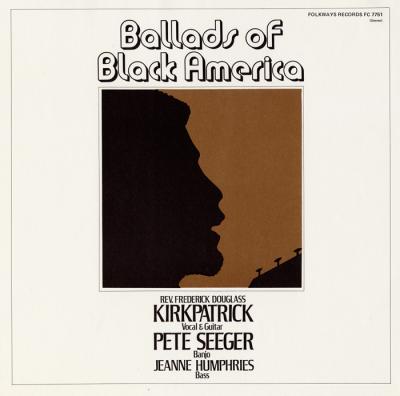
[1972]
Album "Ballads of Black America", Folkways Records.
With Pete Seeger, banjo, and Jeanne Humphries, bass.
Canzone dedicata ai "Deacons for Defense and Justice", organizzazione di autodifesa armata, antesignana delle Black Panthers, diffusasi nei primi anni 60 in alcuni Stati del sud degli USA con l'unico scopo di proteggere le comunità nere dalle continue violenze perpetrate da KKK e altri gruppi razzisti, segregazionisti e suprematisti bianchi...
"Deacons for Defense and Justice were founded in Jonesboro, Louisiana, in 1965 by a small group of local black men who secured licensed guns to defend themselves and their families. New chapters spread over the South and other ports of the country. The Deacons had the courage to stand up and defend their rights even before the better known Black Panthers. Rev. Kirkpatrick was one of this non-violent, self-defense group‘s founders." (dall'introduzione al brano contenuta nel libretto che accompagna l'album)
Si veda anche The Story of Old Monroe.
Album "Ballads of Black America", Folkways Records.
With Pete Seeger, banjo, and Jeanne Humphries, bass.
Canzone dedicata ai "Deacons for Defense and Justice", organizzazione di autodifesa armata, antesignana delle Black Panthers, diffusasi nei primi anni 60 in alcuni Stati del sud degli USA con l'unico scopo di proteggere le comunità nere dalle continue violenze perpetrate da KKK e altri gruppi razzisti, segregazionisti e suprematisti bianchi...
"Deacons for Defense and Justice were founded in Jonesboro, Louisiana, in 1965 by a small group of local black men who secured licensed guns to defend themselves and their families. New chapters spread over the South and other ports of the country. The Deacons had the courage to stand up and defend their rights even before the better known Black Panthers. Rev. Kirkpatrick was one of this non-violent, self-defense group‘s founders." (dall'introduzione al brano contenuta nel libretto che accompagna l'album)
Si veda anche The Story of Old Monroe.
ln Jonesboro Louisiana the year of nineteen sixty five,
(Continues)
(Continues)
Contributed by Alessandro 2010/3/24 - 11:28
Song Itineraries:
Racism and Slavery in the USA
Hands Off Nkrumah
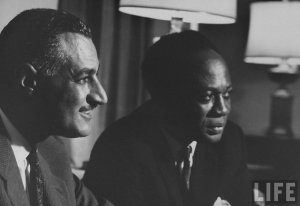
[1968]
Nell’album di Jimmy Collier e del Rev. Frederick Douglass Kirkpatrick “Everybody’s Got A Right To Live”, Broadside Records 1968
Francis Nwia-Kofi Ngonloma, meglio noto come Kwame Nkrumah (1909-1972) è stato un rivoluzionario e politico ghanese, protagonista della stagione della decolonizzazione e della lotta per l’indipendenza africana. Fu il primo presidente del Ghana indipendente (1957). Radicale e anticolonialista in politica estera, convinto assertore della necessità di un governo federale di tutti gli Stati africani (ma con i suoi colleghi non riuscì a mettere in piedi altro che un’organizzazione intergovernativa, l’Organizzazione dell’Unità Africana), in politica interna, dopo alcuni successi iniziali nel campo dell'istruzione e della costruzione di infrastrutture, il socialismo di Nkrumah virò velocemente verso l’autoritarismo: partito unico, presidenza a vita e repressione... (Continues)
Nell’album di Jimmy Collier e del Rev. Frederick Douglass Kirkpatrick “Everybody’s Got A Right To Live”, Broadside Records 1968
Francis Nwia-Kofi Ngonloma, meglio noto come Kwame Nkrumah (1909-1972) è stato un rivoluzionario e politico ghanese, protagonista della stagione della decolonizzazione e della lotta per l’indipendenza africana. Fu il primo presidente del Ghana indipendente (1957). Radicale e anticolonialista in politica estera, convinto assertore della necessità di un governo federale di tutti gli Stati africani (ma con i suoi colleghi non riuscì a mettere in piedi altro che un’organizzazione intergovernativa, l’Organizzazione dell’Unità Africana), in politica interna, dopo alcuni successi iniziali nel campo dell'istruzione e della costruzione di infrastrutture, il socialismo di Nkrumah virò velocemente verso l’autoritarismo: partito unico, presidenza a vita e repressione... (Continues)
Hands off Nkrumah
(Continues)
(Continues)
Contributed by Alessandro 2009/9/28 - 14:50
The Fires of Napalm
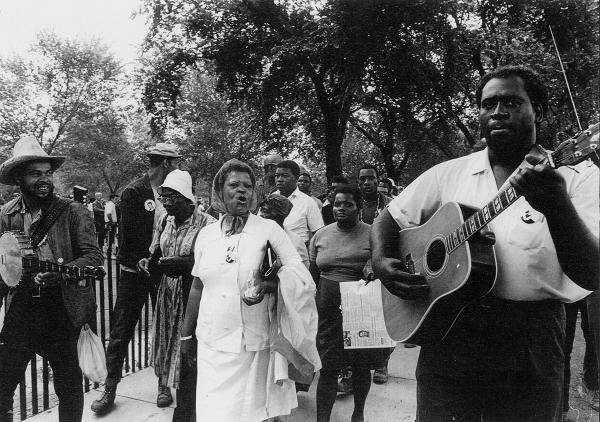
[1968]
Album“Everybody’s Got A Right To Live”
con il Rev. Frederick Douglass Kirkpatrick
Testo pubblicato sul libretto dell’album e su Broadside Magazine n.91 del maggio 1968. Presente anche in Veleno di Piombo sul Muro, le canzoni del Black Power, a cura di Alessandro Portelli, editori Laterza, 1969.
Sul suo sito Jimmy Collier oggi compare vestito da cowboy e non c’è quasi traccia della sua vecchia discografia e, in particolare, di quel potentissimo lavoro intitolato “Everybody’s Got A Right To Live” che realizzò nel 1968 per le edizioni Broadside/Smithsonian Folkways a quattro mani con il reverendo Frederick Douglass Kirkpatrick, pastore, folksinger ed attivista per i diritti civili, fondatore dei “Deacons for Defense and Justice”, gruppo armato di autodifesa della gente di colore attivo in Lousiana e Mississippi e antesignano delle Black Panthers.
Eppure Collier – di padre nero... (Continues)
Album“Everybody’s Got A Right To Live”
con il Rev. Frederick Douglass Kirkpatrick
Testo pubblicato sul libretto dell’album e su Broadside Magazine n.91 del maggio 1968. Presente anche in Veleno di Piombo sul Muro, le canzoni del Black Power, a cura di Alessandro Portelli, editori Laterza, 1969.
Sul suo sito Jimmy Collier oggi compare vestito da cowboy e non c’è quasi traccia della sua vecchia discografia e, in particolare, di quel potentissimo lavoro intitolato “Everybody’s Got A Right To Live” che realizzò nel 1968 per le edizioni Broadside/Smithsonian Folkways a quattro mani con il reverendo Frederick Douglass Kirkpatrick, pastore, folksinger ed attivista per i diritti civili, fondatore dei “Deacons for Defense and Justice”, gruppo armato di autodifesa della gente di colore attivo in Lousiana e Mississippi e antesignano delle Black Panthers.
Eppure Collier – di padre nero... (Continues)
You know we’re wrong
(Continues)
(Continues)
Contributed by Alessandro 2009/7/28 - 14:00
Song Itineraries:
War in Viet Nam as seen from the U.S.
Peace Is The Way
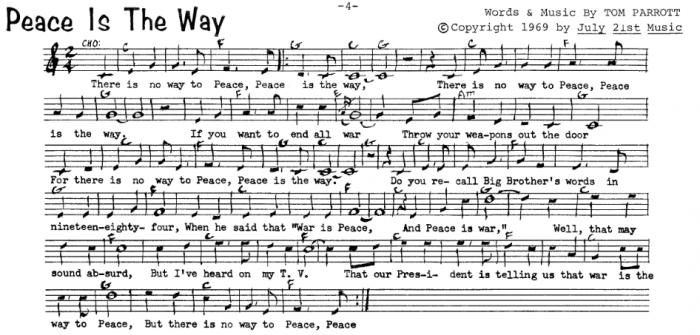
[1969]
Testo trovato su Broadside Magazine n.104 del 1969
Come risulta dall’archivio della biblioteca dell’Università del North Carolina, la canzone fu registrata da Tom Parrott e dal Rev. Frederick Douglass Kirkpatrick su nastro, registrazione che fa parte della “Broadside Collection 1962-1991”
Testo trovato su Broadside Magazine n.104 del 1969
Come risulta dall’archivio della biblioteca dell’Università del North Carolina, la canzone fu registrata da Tom Parrott e dal Rev. Frederick Douglass Kirkpatrick su nastro, registrazione che fa parte della “Broadside Collection 1962-1991”
There is no way to Peace, Peace is the way,
(Continues)
(Continues)
Contributed by Alessandro 2009/6/4 - 14:18
Last Train To Nuremberg
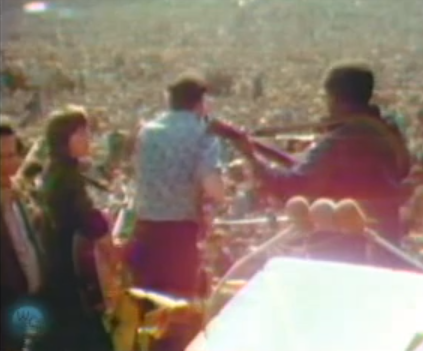
Words and Music by Pete Seeger (1970)
In questa celebre canzone Seeger suggerisce che il tenente Calley, il capitano Medina e il generale Koster, responsabili del massacro di My Lai, dovessero essere processati come i nazisti a Norinberga insieme allo stesso presidente Nixon, alle due camere dei rappresentanti che avevano votato la guerra e infine tutto il popolo americano che con il suo voto aveva legittimato tali crimini.
Iconic American folk singer, Seeger played a key role in the 1950s folk revival and the 1960s anti-war movement. He often wrote political songs, protesting against war, segregation, and calling for environmental protection. Seeger's 1971 anti-war song "Last Train to Nuremberg" (Columbia Records # 4-45398) condemned the My Lai massacre and pointed the finger at several layers of society that had "blood upon" their "hands". Nuremberg refered to the location of the criminal... (Continues)
In questa celebre canzone Seeger suggerisce che il tenente Calley, il capitano Medina e il generale Koster, responsabili del massacro di My Lai, dovessero essere processati come i nazisti a Norinberga insieme allo stesso presidente Nixon, alle due camere dei rappresentanti che avevano votato la guerra e infine tutto il popolo americano che con il suo voto aveva legittimato tali crimini.
Iconic American folk singer, Seeger played a key role in the 1950s folk revival and the 1960s anti-war movement. He often wrote political songs, protesting against war, segregation, and calling for environmental protection. Seeger's 1971 anti-war song "Last Train to Nuremberg" (Columbia Records # 4-45398) condemned the My Lai massacre and pointed the finger at several layers of society that had "blood upon" their "hands". Nuremberg refered to the location of the criminal... (Continues)
Last train to Nuremberg!
(Continues)
(Continues)
2005/10/30 - 17:02
Song Itineraries:
Trains, War in Viet Nam as seen from the U.S.
×
![]()

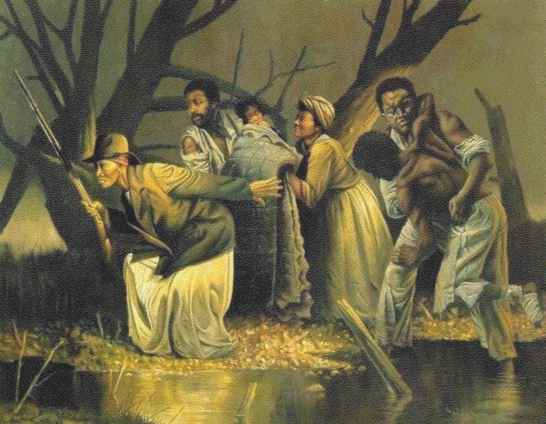
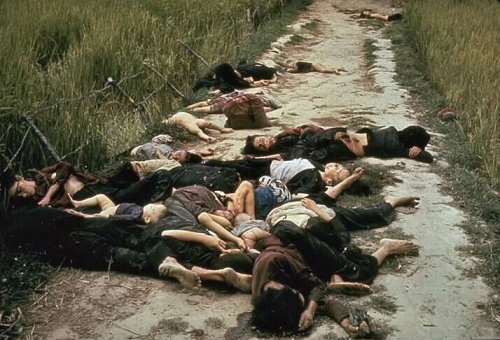
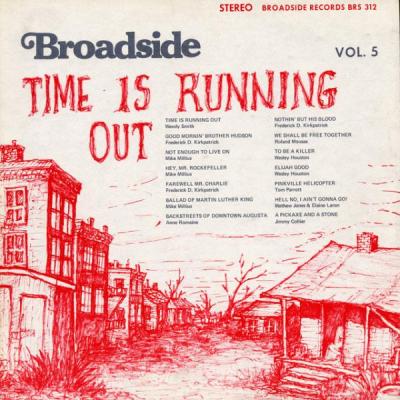
Covered by Pete Seeger e F.D.Kirkpatrick